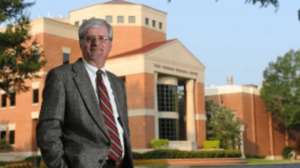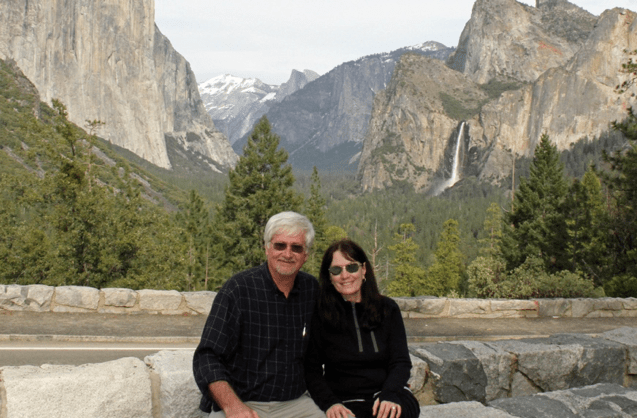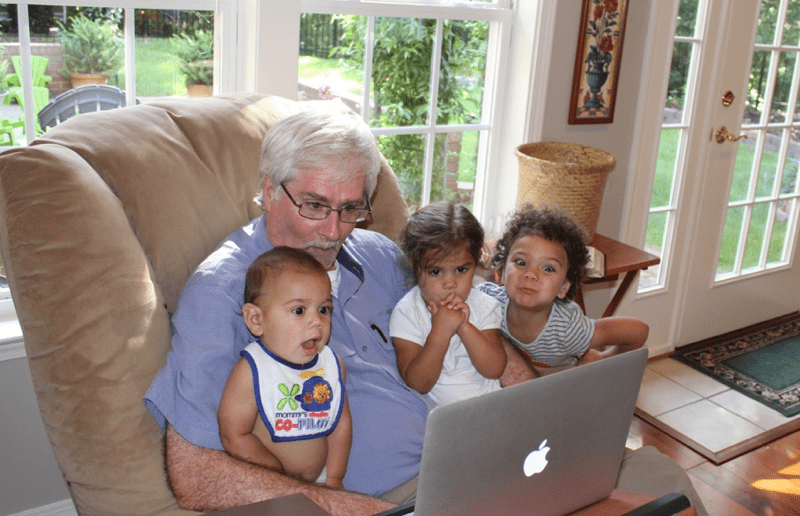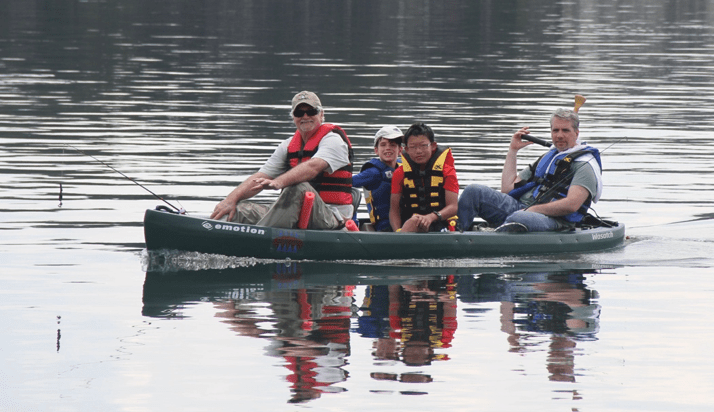Featured
Bonnie Brown: Q&A With Former Director Emeritus of the National Center for Natural Products Research, Larry Walker
*Editor’s Note: The latest installment in the Ole Miss Retirees features is former Director Emeritus of the National Center for Natural Products Research, Larry Walker. The organization’s mission is to enable all of the university’s faculty and staff retirees to maintain and promote a close association with the university. It is the goal of the Ole Miss Faculty/Staff Retirees Association to maintain communication by providing opportunities to attend and participate in events and presentations.
Dr. Larry Walker, Director Emeritus of the National Center for Natural Products Research, retired in 2016 after 35 years of service at Ole Miss. He has continued to work part-time to complete a few projects and to explore some new strategic directions for the Center. Read about his Ole Miss story:

Dr. Larry Walker.
Brown: Where did you grow up? What is special about the place you grew up?
Walker: When I was born we were living in rural Weakley Co., Tennessee. I grew up in the small town of Martin (also in Weakley Co), except for a few years (age 5-8) when we moved to Detroit. Martin was a small college town—about 5,000—the home of UT Martin (in those days about 4000 students). So it was quite a bit smaller than Oxford, but a very close-knit little college town. In a town like this, there were surely some disadvantages. But overall, the positives were far greater. Having family in the county for several generations on both sides, there were few strangers to us, and a huge fraction were actually kin to us. I never knew anything but welcome, neighborliness, and security.
Brown: Please talk about your childhood, parents, and siblings.
Walker: I was born Thanksgiving night 1950, the first of seven children to Martha T. and Eulane Walker. For five generations before me, the Walker and Turbeville families were living in the same vicinity in Weakley County. They were mostly farmers up until my grandparents’ generation, though here and there a school teacher, preacher or local magistrate. I remember very well six of my great-grandparents. They lived not far away and I was blessed to be in their homes a good bit. This is probably something very rare. I could take you today to a rural churchyard cemetery in Weakley County where my parents, two siblings, all four of my grandparents, six of my great-grandparents, dozens of uncles, aunts, cousins are buried, going back almost 100 years.
My mother was married at 16, and I was born a year later. She continued and finished high school shortly after I was born. My dad was a few years older than she, but he only finished 8th grade. He worked at various jobs during my growing up years, but finally settled into carpentry and he continued for decades. He was also preaching every Sunday at one or more small rural churches for 40 years.
There were never two people who worked harder, and more unselfishly, than my parents. They taught me everything important. Above all, to live with dependence on God and purpose toward man. All the rest just came from that. My mother died at the fairly young age of 65, after suffering from cancer for several years. She was tender, beautiful, and tough—and unswerving in faithfulness.
We were a close family. I had two brothers and four sisters. Steve was a year younger; Betsy two years younger; then Tim, Jan, Jill and Amy. Amy was a down syndrome baby, and was really delightful and a blessing to our family. She had a life-long heart defect and died at age 13 – the year I moved to Oxford. In 2013, Dad died at age 85, and just a few days later my boyhood hero Stan Musial died. A few months later my brother Steve was diagnosed with very aggressive colon cancer, and he also died within a few months. That was really a devastating year – the end of so many childhood anchors. But I am still close with my other brother and sisters, and we take joy in one another and our children and grandchildren.
Brown: What was your high school experience like? Were you a good student? What was your favorite subject?
Walker: I was a pretty good student in high school. I found it fairly easy to get good grades – in contrast to college and graduate work. I was salutatorian of my class, and especially liked math and science. I just tolerated English, literature, history and government, but still did pretty well in them.
Brown: Did you play sports? What is your favorite sport?
Walker: I was a basketball player primarily. I loved baseball too and played in the town recreation leagues, but we did not have a high school baseball team. I got a couple of college basketball scholarship offers – one in Atlanta at Oglethorpe University where I earned my bachelor of arts degree. I played there from 1968-1972. I met my wife Pat there—a cheerleader for the basketball team! She had grown up in the Atlanta area and we were married in 1971.
From there I went to pharmacy school. I had worked a little in a drugstore in high school, but had not really aimed for that as a career. But as I finished at Oglethorpe, with no real career plan, Mercer was building a new pharmacy school in Atlanta, and I looked into it, applied and was accepted. I received my Bachelor of Science in Pharmacy from Mercer. I really loved it, especially pharmacology, and when I finished, some of my teachers suggested graduate school. I applied several places, was accepted at Vanderbilt, and I was happy to move back to Tennessee and closer to home.
Vanderbilt is a great institution, with a phenomenal medical school and pharmacology program, and though I didn’t know what I was getting into, it was the greatest preparation I could have received. It was challenging and I almost gave up a couple of times, but finally made it through. It opened doors I could never have imagined. I received my Ph.D. from Vanderbilt.
Brown: What about your family?
Walker: During pharmacy school, our first child Brian was born, and shortly after I enrolled in graduate school, we adopted an 18-month old boy from Korea. In the waning years of the Vietnam War, a number of South Vietnamese orphans were being placed in the U.S. We applied to adopt one, but by the time all the paperwork was done, the Vietnamese government had changed hands and the placements stopped. The agency we had been working with later had this little Korean boy, and they contacted us.
Near the end of my graduate work, my major professor at Vanderbilt, a native German, took a position in Stuttgart as head of a clinical pharmacology institute. He asked me to come and spend a year or two with him, to help set up his research laboratory. So I went, with Pat, Brian (6 yrs) and Cory (3 yrs), and we lived and worked in Germany for one year.
I returned to United States in 1979 to do a postdoctoral term at Dartmouth Medical School. Our daughter Dani was born there in 1980. By 1981, with our growing family and having been three years out of graduate school, away from our families, with limited income, I was looking for a “real job”, as my wife would say. She has worked to support us all through our marriage, but it was particularly hard for a young family in those pharmacy school, grad school, and postdoc years.

Larry and wife Pat at Yosemite National Park with El Capitan in background. Photo provided.
Brown: Tell us how/when your Ole Miss “story” began? Who hired you? How long did you work at Ole Miss?
Walker: I interviewed for a couple of industry positions, but these were both in the northeast, and we were really wanting to move further south. Positions were open in pharmacy schools at Georgia and Mississippi, and I applied. I interviewed in the summer of 1981, and was hired at Ole Miss in the Research Institute of Pharmaceutical Sciences (RIPS). Dr. Wallace Guess was the Dean at that time, Dr. Carlton Turner was the Director of RIPS, and Dr. Jim Murphy was the head of the Biological Sciences division. By the time I arrived in the fall, Dr. Turner had moved to D.C. to become President Reagan’s “drug czar”, and Dr. Tom Sharpe was the interim director of RIPS. It was in Oxford that our two youngest children, Isaac and Carrie, were born in 1982 and 1984. And so we settled into a long, fulfilling and joyful life in Mississippi.
In the first year or two, I worked mainly on extensions of my graduate and postdoc work, but gradually developed other projects and collaborations, including several on natural products with Mahmoud ElSohly, Alice Clark, Charlie Hufford and Jim McChesney, who was chair of Pharmacognosy, but was later hired as the Director of RIPS, to develop his vision for the natural products center. One collaboration led to another over the years, and by 1995 when the National Center for Natural Products Research (NCNPR) opened up, I was fully involved in work on natural products discovery. I was asked by Dr. Clark, the first NCNPR Director, to serve on an interim basis as associate director. This later turned out to be a permanent appointment. Then when Dr. Clark moved to the position of Vice-Chancellor for Research and Sponsored Programs, I was interim director for a year, then chosen as director. I served 16 years as director and then retired after more than 36 years with Ole Miss.
Brown: What did you know about Ole Miss before you accepted a position here?
Walker: Well, before pharmacy school I knew very little about Ole Miss, except familiarity with it as an SEC school, some of the famous sports figures, and of course the publicity about race relations, James Meredith, etc. But at Mercer, I had four teachers who did graduate work at Ole Miss in the pharmacy school: Jerry McHan, Richard Jackson, Vincent Lopez, and Stanley Pollock. I began to learn about the great legacy here. Sometime in 1974 or 75, Dr. Norman Doorenbos, then a Pharmacognosy faculty member at Ole Miss, came to Mercer and did a presentation for the students about research on medicinal plants. I was fascinated by it, though it would be several years and a long track before I came around to direct involvement.
Brown: You have been so involved with the National Center for Natural Products Research (NCNPR) since it was established in 1995. Please talk about some of the research. What is your prediction for its continued impact? Tell us about the partnership with the Food and Drug Administration (FDA).
Walker: The NCNPR was originally conceived as a partnership between state and federal U. S. Department of Agriculture(USDA) governments, and from the opening in 1995 we have worked hand-in-hand with the USDA. This collaboration entails more than 30 USDA personnel co-located at NCNPR. They have their own mission and projects on natural products in agricultural applications, while we focus more on human health-related aspects; however, we have developed several joint projects, patents, and publications.
The FDA work first developed in 2000, when Ephedra products were very popular as botanical supplements in the U.S. Some companies were selling products spiked with the chemical ephedrine, and there were some adverse events. The NCNPR, with Dr. Clark and Dr. Ikhlas Khan’s leadership, submitted a project aimed at understanding the chemistry of different Ephedra species, sources of ephedrine and pseudoephedrine in nature, and how to distinguish and measure them. This led to the broader FDA program, which works on scientific methods, standards, and data to ensure quality and safety of botanical supplements. This work has grown in importance over the years, because of the great interest in natural supplements, and many companies who market substandard or even fraudulent products with outlandish claims.
Another “high profile” project is the cannabis project, funded for more than 50 years at Ole Miss via the National Institute on Drug Abuse, and directed by Dr. Mahmoud ElSohly. This contract provides cannabis and derived products, including purified cannabinoids, for research nationally. This has led to a number of additional research projects on cannabinoids, including CBD, and new analogs for development.
Brown: I know you have continued to work on some projects. What are the pros and cons of continuing to work after retirement?
Walker: There were a few of my personal interest research projects that remained incomplete, and for a couple of them we had some external funding to continue the work. There were also a few strategic collaborations we were trying to develop, and Pharmacy School Dean David Allen and Dr. Khan, current NCNPR director, wished to have my input on these. These were all things of special interest and importance to me, so I came back part time to give some attention to them. Unfortunately, but not surprisingly, they have all turned out to require more time than anticipated, and new things keep cropping up. But on the plus side, I really love the program, the people, and I enjoy staying active and involved. My time is flexible enough that I can also enjoy more family time and more focus on church and friends.

Three of Walker’s 13 grandchildren (Austin, Claire and Sadie) as the Big Bad Wolf makes his entrance!
Brown: Who influenced you in your early life? Did you have a mentor who influenced your career choice?
Walker: Well, my parents were the anchor and foundation of everything for me—morally, spiritually, intellectually. They never pushed me toward any career path, but made it so that I could reach wherever I wanted – so long as it was before God. I had a teacher in high school, Mrs. Barbara Trentham, who greatly influenced me toward science, but also in basic human kindness and professionalism. As to career choice, I would credit Dr. Stanley Pollock and Dr. Vince Lopez from Mercer. They gave me such encouragement and direction on reaching toward things that I had aptitude for, but still knew little of.
Brown: You have received many awards during your career. Please tell us which one means the most and why.
Walker: The greatest awards I have received have been the encouragement and love—formal and informal—from family, friends, and church family who made my work possible, and to my co-workers—also dear friends—who actually did most of the work!

Fishing with grandsons Gavin and Andrew, and son Brian.
Brown: If money were no object, where would you like to go on vacation?
Walker: My favorite vacation would be at a cabin in the mountains with family. Pat and I enjoy traveling many places, but especially have enjoyed going to Bible lands. I also love visiting in England and Scotland. One of our favorite vacation spots in the U.S. was in the Wyoming/Grand Tetons area.
Brown: What three words best describe you?
Walker: I wish they would be: faithful, strong and merciful. In reality, I think they are: cheerful, dedicated, and oft-forgetful.
Brown: In your opinion, what attributes/traits predict success in life?
Walker: “Try not to become a man of success, but rather try to become a man of value.” –Einstein
Also purpose, loyalty, submission to God and love.
Brown: Do you have a favorite quote? What is it and why is it your favorite?
Walker: Here are two:
A fellow can’t afford to die now, with all this excitement going on.” -Will Rogers
It seems to quaintly capture something true about us, that when we finally come to see the truth and value of everlasting things, then life is beautiful and precious.
“The principal part of faith is patience.” -George MacDonald
Faith is trust and reliance on another; when it comes to our reliance on God, it is submission and surrender. We learn to express that in patience and perseverance.
Brown: What has been your routine since retirement? Do you have any hobbies?
Walker: I usually rise early, and my intent is to do some reading, prayers, light exercise. But lately I have been going into work many days, and it has taken more time than I intended. But my schedule is flexible, and I take some time with children/grandchildren and to do a few little projects at home. I am regularly active in church work and really enjoy it.
Brown: To quote Katherine Meadowcroft, cultural activist and writer, “What one leaves behind is the quality of one’s life, the summation of the choices and actions one makes in this life, our spiritual and moral values.” What is your legacy?
Walker: Well, I hope my legacy might be that we consciously tried to see into God’s great hope of reconciling men and women to himself, creating in Christ a blessed body of people as instruments of that purpose. I hope that somehow we have helped others to see the cross of Christ in this light. I hope that our family (five children and 13 [soon to be 14] grandchildren) has been equipped with that understanding, or at least given a good foundation toward it. That we somehow were able to touch others in this world—in our church circle and outside—to help bring about this will of God in our corner.

The whole gang gathered at Christmas 2016.
In our work setting, I strongly believe that human relationships, cemented by a common purpose, are more important than the ebb and flow of projects and awards, promotions and funding. In spite of practical challenges in applying that, I hope that one legacy of mine is the fostering of strong and lasting bonds of loyalty and love between co-workers at all levels, transcending the besetting financial and administrative complications.






























Bettye Galloway
April 25, 2019 at 3:49 pm
A truly great member of the Ole Miss family!
Bonnie Brown
April 25, 2019 at 6:27 pm
Absolutely! And a truly nice guy. Thanks for reading my articles!